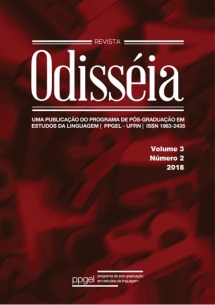Brazil from a foreigner’s point of view
identity, alterity and history in Mino Carta’s O castelo de âmbar
DOI:
https://doi.org/10.21680/1983-2435.2018v3n2ID15505Keywords:
Brazilian Literature, Journalism, Identity, ForeignAbstract
This research aims to analyze the novel O castelo de âmbar, written by journalist Mino Carta, who was born in Italy and brought up in Brazil. The purpose is to examine the way a foreign intellectual sees and interacts with the second half of the 20th century Brazil, especially during the dictatorship period. This paper outlines the elements of foreign writing and analyzes the interaction between the autobiographical and fictional aspects of the novel. The analysis was based on Philippe Lejeune’s research in the field of autobiography in its multiple facets; Jacques Derrida’s studies on immigrant literature, identity and alterity; and Charles Melman’s research on immigrants and their relationship with a new language in another country. This novel can, therefore, be classified as a self-fictional and historical novel which depicts the deterritorialization and the author’s cultural hybridity in a nostalgic, critical and ironic way.
Downloads
Downloads
Published
How to Cite
Issue
Section
License
Thisa work has been licensed under Creative Commons - Atribuição - NãoComercial - CompartilhaIgual 3.0 Não Adaptada.


















